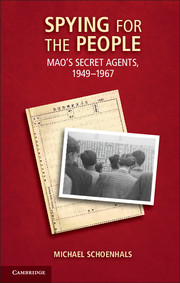2 - Agents by Category
Informers, Enablers, and Guardians
Published online by Cambridge University Press: 05 January 2013
Summary
If all one had to go by were contemporary foreign visitors’ reports, one could be excused for believing that the operational activities of public security organs in Mao's China were entirely a matter of mobilizing the revolutionary masses. “I still have to meet someone,” a resident Belgian correspondent for Agence France Presse wrote in the early 1960s, “who has actually discovered a microphone in his Peking home or office.” A Canadian journalist working for the Globe and Mail described at some length the housewife “with the knitting needles” residing on the ground floor, who kept an eye on the activities and habits of her neighbors. “To maintain the security and interests of the state,” he wrote in 1958, was one of her “unspoken duties.”
Yet the neighborhood watch that casual observers might catch a glimpse of did not convey the whole picture. Yes, urban police stations were aided on a voluntary basis by a sizable local contingent of so-called social eyes and ears (shehui ermu), who kept an eye on people deemed of interest. But in addition, well out of sight, public security organs employed assets of an altogether different sort. On the final day of the 1st National Conference on Economic Protection Work in 1950, Luo Ruiqing had explained to officers from all over China why “history” would punish them unless they developed specialized and entirely covert operational resources “as a basic means whereby we can vanquish our enemies.” In the short run, any officer dragging his feet in regard to developing covert resources, he added, in what sounded like a veiled threat, would also be committing “a major political error.” Given the highest ministerial seal of approval, public security organs set about aggressively recruiting and secretly deploying large numbers of agents. Looking back in 1957, it was possible for the CMPS to assert that “the agent contingent of the public security organs, having been built up over a number of years, is already of a definite size and has played a major role in operational work.”
- Type
- Chapter
- Information
- Spying for the PeopleMao's Secret Agents, 1949–1967, pp. 51 - 84Publisher: Cambridge University PressPrint publication year: 2013

